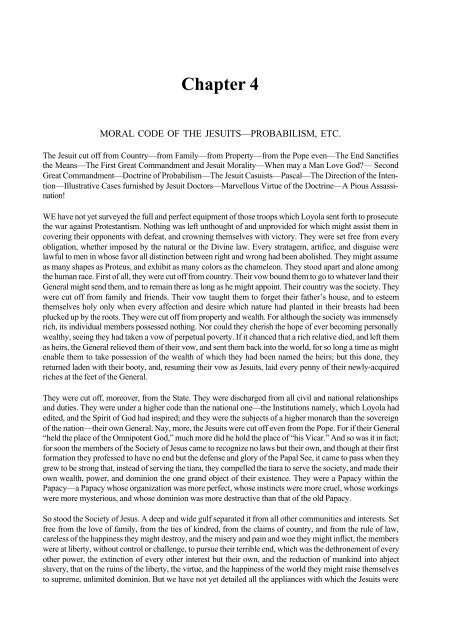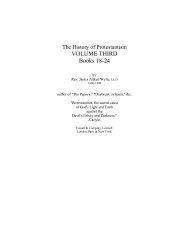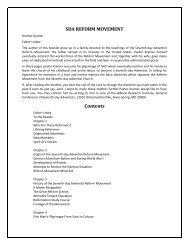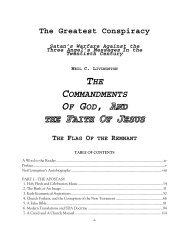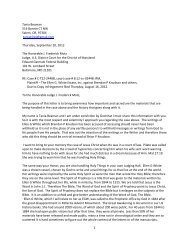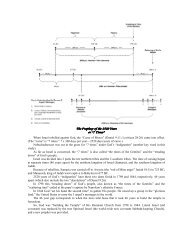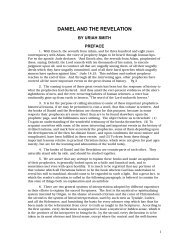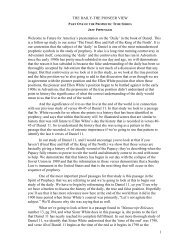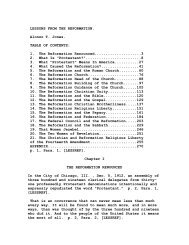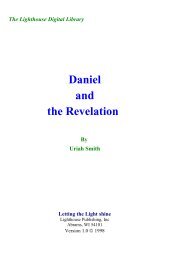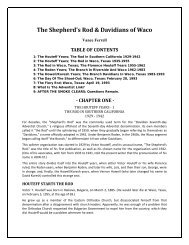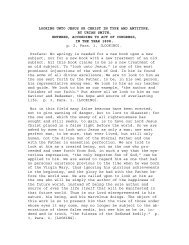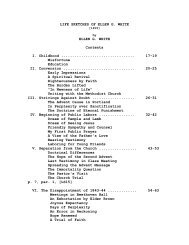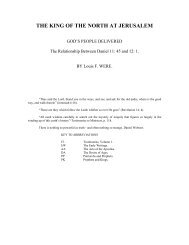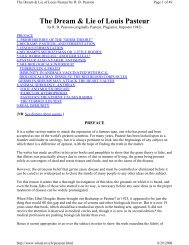History of Jesuits
History of Jesuits
History of Jesuits
You also want an ePaper? Increase the reach of your titles
YUMPU automatically turns print PDFs into web optimized ePapers that Google loves.
Chapter 4<br />
MORAL CODE OF THE JESUITS—PROBABILISM, ETC.<br />
The Jesuit cut <strong>of</strong>f from Country—from Family—from Property—from the Pope even—The End Sanctifies<br />
the Means—The First Great Commandment and Jesuit Morality—When may a Man Love God?— Second<br />
Great Commandment—Doctrine <strong>of</strong> Probabilism—The Jesuit Casuists—Pascal—The Direction <strong>of</strong> the Intention—Illustrative<br />
Cases furnished by Jesuit Doctors—Marvellous Virtue <strong>of</strong> the Doctrine—A Pious Assassination!<br />
WE have not yet surveyed the full and perfect equipment <strong>of</strong> those troops which Loyola sent forth to prosecute<br />
the war against Protestantism. Nothing was left unthought <strong>of</strong> and unprovided for which might assist them in<br />
covering their opponents with defeat, and crowning themselves with victory. They were set free from every<br />
obligation, whether imposed by the natural or the Divine law. Every stratagem, artifice, and disguise were<br />
lawful to men in whose favor all distinction between right and wrong had been abolished. They might assume<br />
as many shapes as Proteus, and exhibit as many colors as the chameleon. They stood apart and alone among<br />
the human race. First <strong>of</strong> all, they were cut <strong>of</strong>f from country. Their vow bound them to go to whatever land their<br />
General might send them, and to remain there as long as he might appoint. Their country was the society. They<br />
were cut <strong>of</strong>f from family and friends. Their vow taught them to forget their father’s house, and to esteem<br />
themselves holy only when every affection and desire which nature had planted in their breasts had been<br />
plucked up by the roots. They were cut <strong>of</strong>f from property and wealth. For although the society was immensely<br />
rich, its individual members possessed nothing. Nor could they cherish the hope <strong>of</strong> ever becoming personally<br />
wealthy, seeing they had taken a vow <strong>of</strong> perpetual poverty. If it chanced that a rich relative died, and left them<br />
as heirs, the General relieved them <strong>of</strong> their vow, and sent them back into the world, for so long a time as might<br />
enable them to take possession <strong>of</strong> the wealth <strong>of</strong> which they had been named the heirs; but this done, they<br />
returned laden with their booty, and, resuming their vow as <strong>Jesuits</strong>, laid every penny <strong>of</strong> their newly-acquired<br />
riches at the feet <strong>of</strong> the General.<br />
They were cut <strong>of</strong>f, moreover, from the State. They were discharged from all civil and national relationships<br />
and duties. They were under a higher code than the national one—the Institutions namely, which Loyola had<br />
edited, and the Spirit <strong>of</strong> God had inspired; and they were the subjects <strong>of</strong> a higher monarch than the sovereign<br />
<strong>of</strong> the nation—their own General. Nay, more, the <strong>Jesuits</strong> were cut <strong>of</strong>f even from the Pope. For if their General<br />
“held the place <strong>of</strong> the Omnipotent God,” much more did he hold the place <strong>of</strong> “his Vicar.” And so was it in fact;<br />
for soon the members <strong>of</strong> the Society <strong>of</strong> Jesus came to recognize no laws but their own, and though at their first<br />
formation they pr<strong>of</strong>essed to have no end but the defense and glory <strong>of</strong> the Papal See, it came to pass when they<br />
grew to be strong that, instead <strong>of</strong> serving the tiara, they compelled the tiara to serve the society, and made their<br />
own wealth, power, and dominion the one grand object <strong>of</strong> their existence. They were a Papacy within the<br />
Papacy—a Papacy whose organization was more perfect, whose instincts were more cruel, whose workings<br />
were more mysterious, and whose dominion was more destructive than that <strong>of</strong> the old Papacy.<br />
So stood the Society <strong>of</strong> Jesus. A deep and wide gulf separated it from all other communities and interests. Set<br />
free from the love <strong>of</strong> family, from the ties <strong>of</strong> kindred, from the claims <strong>of</strong> country, and from the rule <strong>of</strong> law,<br />
careless <strong>of</strong> the happiness they might destroy, and the misery and pain and woe they might inflict, the members<br />
were at liberty, without control or challenge, to pursue their terrible end, which was the dethronement <strong>of</strong> every<br />
other power, the extinction <strong>of</strong> every other interest but their own, and the reduction <strong>of</strong> mankind into abject<br />
slavery, that on the ruins <strong>of</strong> the liberty, the virtue, and the happiness <strong>of</strong> the world they might raise themselves<br />
to supreme, unlimited dominion. But we have not yet detailed all the appliances with which the <strong>Jesuits</strong> were


